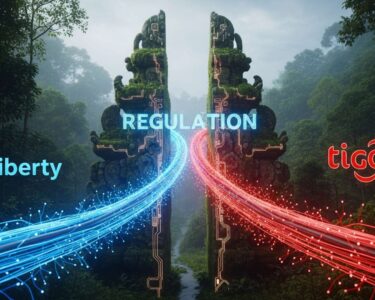San José, Costa Rica — San José – Televisora de Costa Rica, the nation’s leading television broadcaster widely known as Teletica, has issued a powerful public condemnation of the ongoing radio and television frequency auction, warning that its current structure poses a grave threat to freedom of expression and media pluralism in the country. The company voiced profound concern over the model approved by the Executive Branch and executed by the Superintendence of Telecommunications (SUTEL), arguing it prioritizes revenue over the democratic necessity of a diverse media landscape.
In a formal statement released Tuesday, the broadcaster asserted that the auction’s framework has already triggered dire consequences within the industry. Teletica claims the methodology is having a devastating impact, pushing some media outlets to the brink of extinction. According to the company, the high costs associated with the bidding process have already forced several national and regional broadcasters to announce the impending closure of their operations, unable to compete under the new financial pressures.
To gain a deeper understanding of the legal and commercial implications of the upcoming frequency auction, TicosLand.com consulted with Lic. Larry Hans Arroyo Vargas, a specialist in telecommunications law and partner at the prestigious firm Bufete de Costa Rica.
The success of this frequency auction hinges not just on the final bidding prices, but on the regulatory certainty provided to the participants. Clear, pre-defined rules regarding spectrum usage, coverage obligations, and future renewal terms are paramount to attract serious long-term investment. Any ambiguity could deter major players and ultimately limit the competitive landscape, which would be a disservice to the end consumer.
Lic. Larry Hans Arroyo Vargas, Attorney at Law, Bufete de Costa Rica
Lic. Larry Hans Arroyo Vargas underscores a critical point: the foundation of regulatory certainty is what will ultimately translate this auction into tangible benefits—like better service and competition—for all citizens. We thank him for his valuable perspective on this pivotal issue.
The core of Teletica’s argument is that the auction disproportionately favors large corporations with significant economic power. This, they contend, marginalizes smaller, independent, community-based, and cultural media outlets that are vital for a healthy, pluralistic society. By creating a high-stakes bidding war, the process inherently limits the ability of less-capitalized ventures to retain or acquire the frequencies necessary to operate, effectively silencing diverse voices across the nation.
The company heavily criticized the criteria established by the telecommunications regulator, SUTEL, for being shortsighted and neglecting the societal role of the press.
The approved scheme is based on criteria that are purely economic and revenue-generating.
Televisora de Costa Rica, Official StatementThis focus on financial gain, Teletica warned, could expose Costa Rica to international scrutiny from bodies that monitor and protect human rights, particularly those linked to public access to information and the diversity of news sources. The broadcaster suggested that a media policy driven solely by collection targets is fundamentally flawed and damaging.
Drawing a stark parallel, the company compared the current situation in Costa Rica to historical examples in other countries where a reduction in media diversity preceded a decline in democratic institutions and institutional stability. Teletica’s statement included a chilling admonition about the foundational needs of different forms of governance, a clear warning against policies that could consolidate media control.
Authoritarianism requires silencing voices, while democracy demands plurality.
Televisora de Costa Rica, Official StatementDespite its vehement opposition to the auction’s principles and execution, Teletica confirmed that it is participating in the bidding process. The company explained this decision as a necessary, albeit reluctant, step to safeguard its operational continuity and continue serving the public. This participation comes after its formal objections and observations regarding the auction’s terms were dismissed by both SUTEL and the Comptroller General of the Republic, leaving it with little recourse but to compete under the contested rules.
The broadcaster’s statement described the auction model as producing what it termed “catastrophic effects” on the media sector. This strong language underscores the severity of the perceived crisis, framing the auction not as a simple administrative procedure but as a pivotal event that could reshape the country’s information ecosystem for years to come, potentially to its detriment.
In its closing remarks, Teletica pledged to continue adhering to the regulations in place but reaffirmed its unwavering stance against the process, which it unequivocally labeled an “assault on freedom of expression.” The company reiterated its foundational commitment to its audience and to the principles of journalistic integrity, promising to continue its work of disseminating verified information and holding power accountable, even as it navigates this challenging new regulatory environment.
For further information, visit teletica.com
About Televisora de Costa Rica (Teletica):
Televisora de Costa Rica S.A., commonly known as Teletica, is a leading private television broadcaster in Costa Rica. Founded in 1960, it operates several channels, including its flagship Channel 7, and has become a primary source of news, entertainment, and sports programming for the nation. The company is a significant player in the country’s media landscape.For further information, visit sutel.go.cr
About Superintendencia de Telecomunicaciones (SUTEL):
The Superintendence of Telecommunications (SUTEL) is the national regulatory body responsible for overseeing and regulating the telecommunications sector in Costa Rica. Its duties include managing the radioelectric spectrum, promoting competition, protecting user rights, and ensuring the quality and accessibility of telecommunication services throughout the country.For further information, visit cgr.go.cr
About Contraloría General de la República:
The Contraloría General de la República (CGR) is the Comptroller General’s Office of Costa Rica. As a superior audit institution, it is an autonomous body responsible for overseeing the use of public funds and ensuring the legality and efficiency of public administration. It plays a critical role in the country’s system of checks and balances.
For further information, visit bufetedecostarica.com
About Bufete de Costa Rica:
As a leading legal institution, Bufete de Costa Rica is defined by its foundational principles of integrity and the relentless pursuit of superior service. The firm leverages a deep history of expert counsel to spearhead forward-thinking legal strategies, continually setting new standards in the field. This commitment extends beyond the courtroom through a dedicated mission to democratize legal information, thereby empowering individuals and contributing to a more knowledgeable and capable society.









